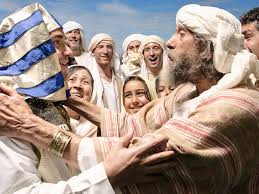Rabbi Lazer Gurkow Chabad.com
Treasure the moment one meets with a loved one after a long separation.
The Reunion
Do you know the feeling of meeting up with your spouse after being apart for several days or even weeks? How about seeing your child come home from school for the first time in months or seeing family members that live halfway across the world? It is a giddy feeling, a special moment of joy and happiness. You want to commemorate it in a special way, but don’t know how.
Struggle no more, our sages have paved the way in the form of a blessing. We all know it. It’s the Shehechiyanu. It sounds Chinese of course, “Shehechiyanu, V’kiyemanu, V’higianu,” Once we get started we can get through it, but don’t ask us to spell it, right? Actually, don’t even ask me what it means, it’s one of those things we say, but have no idea why. Right?
Well, fret no more. I have the translation right here for you. “Blessed are You, Lord our G-d, King of the Universe, who has granted us life, sustained us and enabled us to reach this occasion.”[1]
What a beautiful blessing. A special moment comes along and we find a way to invoke G-d’s name. He brought us here, He sustained us, He made it happen, and He made us happy. It is an acknowledgement that this wonderful moment is not the exception to life, but its culmination. Life and everything that happened till now, has been leading us to this exceptional moment. Now that we have experienced it, everything falls into place. The penny drops and life makes sense again.
We get this idea from Jacob. When he first met Joseph after twenty-two years, he chose to recite the Shema. “Hear O’ Israel, G-d is our lord, G-de is one.” He dedicated his reunion with his long lost son to G-d. All the passion, joy and giddy excitement of the meeting were channeled into a prayer to G-d. This wasn’t just about the special moment. This was about G-d, who made the moment happen.
Is it Really That Good?
Okay. Now that the moment has passed and the giddiness is settling down, it is time to take a closer look at the words we chanted with boundless enthusiasm. Do they really make sense? This moment is a special one, no doubt. But the countless hours of boredom and drudgery, the months of anxiety and anticipation, they weren’t all good, were they?
Surely, we are happy that it came to a good conclusion as the saying goes, “All’s well that ends well,” but life could have been much nicer if our loved ones had never departed in the first place. We say this blessing every time we get to do a Mitzvah for the first time in a year like when we eat the Matzah on Passover.[2] Now let’s be honest, are we really grateful for the weeks of hard work that lead up to Passover? Life would have been much simpler if we didn’t need to work so hard or suffer so much. Now that it is finally over and we get to enjoy, must we rewrite history and call those harsh moments blissful?
Yes It Is
Ah, surely as you read these words you are thinking that those moments are indeed special. Matzah would not be so thrilling if it were not earned by weeks of hard labor. Reunions would not be so sweet if they were not preceded by months of separation. Now that we have arrived to the culmination, we can appreciate that life’s harshness only enhances its sweetness. It makes the special moment more special.
This is true, but it’s not enough. If G-d were truly kind, He would have allowed us to appreciate a constant diet of goodness without needing to contrast it against the bleaker side of life. It appears a cruel joke on G-d’s part that we must endure hardship in order to appreciate blessing.
Allow me to share an insight that will change the way you chant this blessing.
The Truly Enjoyable
When we thank G-d for granting us life, we are not just grateful for G-d’s gift of life, we are thanking Him for the gift of G-d in our life. Without G-d, life is just about us. It is about the things we enjoy and from which we derive pleasure. If we examine our day we discover that we enjoy very little of it.
We work to make money. If we could make money without working, we would jump at the opportunity. This means that we aren’t working because we like to work. We work because we must. Given the chance, we could find more gratifying ways to spend our time.
We make money to buy what we need. Food, clothing, shelter, security etc. This means that money making is also not our primary objective. If we had money, but there was no food to be bought, the money would have no value to us. So making money is also a necessity, not a pleasure.
Eating then. Is eating the purpose of our lives? No, we eat to gain strength and energy. If we could have that energy without eating or sleeping, we would jump at the opportunity. Who wants to waste hours each day in a comatose state while life passes us by? Who wants to expend energy shopping, cooking, eating, cleaning, washing and digesting, if we could get that energy safely from a pill?
So what do we enjoy? What is our real passion and purpose? To each, their own. We each have pastimes and activities that we really and truly enjoy. But how much of our time is devoted to these activities? Is it five percent of our day, ten percent, twenty? The bottom line is that we spend very little time enjoying life and most of our time providing for life. This is a sad thought.
This sorry fact is bought into sharp relief when we see a loved one for the first time after waiting a long time. We realize that we spent years preparing for a brief moment of joy. The thrill of reunion is sharpest in the first instant and then it fades. Within days of the reunion, we take each other’s presence for granted. We wasted years for a day’s pleasure, for a moment’s thrill. What’s so special about that?
All For The Boss
This is when we chant the blessing of Shehechiyanu. Life is a G-dly gift and when viewed that way, everything we do is an end, not a means. Who is to say that G-d enjoys only the things that we enjoy? If we go to work and conduct ourselves as G-d wants us to, G-d takes pleasure in it. If we sit down to dinner and eat kosher while chanting our blessings and sharing with the poor, G-d derives much pleasure from us. Everything we do, every moment we live, we live with G-d.
And every moment with G-d is special. Not just the ones that are special to us. Every moment is a gift; a thrill in its own right. It is never about preparing for the moments that we register as special. It is always about living and serving G-d in each moment. Because each is as special to G-d as this one was to us.
Shehechiyanu. Thank you G-d, for granting us life.[3]
Sources:
[1] Code of Jewish law 223: 4. See also 225: 1.
[2] Ibid 473: 1.
[3] Based on Likutei Sichos v. 19 . p. 376. It is fascinating to note that the chapter immediately following the laws about Shehechiyanu in the code of Jewish law (231) is about engaging in every endeavor for G-d’s sake.
